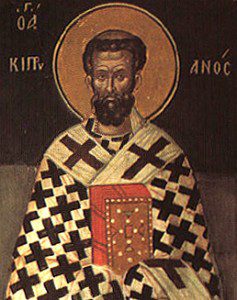Despite some of our recent unpleasantries, I’m still a fan of the Big Tent of Paganism. We do our own things and we work deeply within the traditions that speak to us, but we come together to share what we learn and to support our common interests. I like the Big Tent because I like learning from the many and varied groups and traditions within it.
Perhaps the hottest area under the Big Tent these days is sorcery. Some call it wizardry, some call it ceremonial magic – it’s basically working with various spirits to work magic, to learn and grow, and to navigate life more effectively. I blame the popularity on Gordon White and especially on his Rune Soup podcast, which frequently features sorcerers and ceremonial magicians. But there has never been a time when people weren’t working with spirits in a more or less sorcerous fashion – Gordon is simply sorcery’s best current publicist.

One of the most popular spirits is Saint Cyprian. His feast day is September 16 in the Catholic and Orthodox churches and September 26 in the Anglican church, so he’s getting even more attention right now. He was born in Carthage in 200 CE and became a powerful pagan magician. When his magic was thwarted by a woman making the sign of the cross, he converted to Christianity and became a priest and then a bishop. He was executed by the Roman proconsul Galerius Maximus in 258 and is considered a Christian martyr.
Jason Miller at Strategic Sorcery has an excellent blog post on what it means to work with a Christian saint.
If you want Cyprian, you kind of have to take Christ with him … The Chrysm that anointed Cyprian a Bishop is at the heart of what makes his oil potent. If you are looking for powerful Pagan Magicians to venerate there is no shortage of them, but there is only one St. Cyprian, and yeah, he is a Bishop.
Pagans have been de-Christianizing and re-Paganizing stories, prayers, and magical workings since the beginning of the modern Pagan movement. For example, none of our existing Celtic stories were written down until well into the Christian era and many have been edited from their original forms. Putting them back the way they were – forensically when we can, speculatively when we can’t – is good and often necessary work and I’ve done my share of it.
But reclaiming our ancestral heritage is one thing. Praying to someone who gave up that heritage because he saw an opportunity for power in a new religion is quite another. As Jason points out, Saint Cyprian is not just a magician. He’s a Christian priest, bishop, and martyr. His story is the story of the triumph of Christianity over paganism, of monotheism over polytheism. When you call on Saint Cyprian, you’re affirming that history.
Perhaps you’re OK with that. Jason makes a point echoed by Gordon White and some of his podcast guests: Christianity is not inherently fundamentalist and dominating. As I said in last year’s Letter To My Christian Friends, as a polytheist I have no difficulty acknowledging Jesus as a God – just not as the only God. For centuries, magicians in Christian dominated regions have practiced magic within a Christian context, despite the official prohibitions against it. They left us many of the grimoires that are currently so popular. If you’re a Christian with an interest in magic, I encourage you to work with Saint Cyprian.
But I’m not trying to work magic in a Christian context. I’m trying to create a Pagan and polytheist context for the ecstatic, oracular, magical, devotional, ancestral religion I’m practicing along with many others. While I occasionally dip my toe into the waters of sorcery, at the end of the day I’m a devotional polytheist who prefers to worship and work with the mightiest of spirits – Gods.
I’m sure many of the people trying to de-Christianize Cyprian are good inclusive liberals who strongly disapprove of cultural appropriation. But that’s exactly what they’re doing when they de-Christianize Saint Cyprian – they’re appropriating him out of his Christian context for their own purposes. “Hey, I know you willingly died rather than recant your Christian faith, but I don’t like Christianity. You won’t mind helping me do some Pagan stuff anyway, right?”
Predictably, Jason has a commenter who says he did exactly this and got good results. But that’s disrespectful to the spirit he’s calling on, and it’s as inauthentic as white suburban Americans trying to do a sun dance in their back yard. You may get some results, but without the context of the Plains Indians cultures it will be a weak facsimile of the real thing.
So I can’t work with Saint Cyprian. It would be inauthentic and it would work against my core goal of facilitating a Polytheist Restoration.
As Jason points out, there are plenty of Pagan magicians to venerate and emulate. There’s no reason you have to work with Saint Cyprian just because he’s currently popular.
When I need help with magic, I usually go to Auset (Isis). One of Her titles is Mistress of Magic – She learned the true name of Ra and in doing so, learned the secrets of all magics. Or I may ask for help from the Morrigan, whose expertise in magic (especially battle magic) is shown throughout Her lore. I also may ask for help from certain Druid spirits who’ve made themselves known to me.
I have long, committed relationships with all these Gods and spirits based on shared heritage, shared goals, mutual respect and reciprocity. They aren’t names I picked out of some arcane book.
I’m fascinated by sorcery and I’m intrigued with its current popularity. It has roots in an ancient polytheist worldview, and there is a place for it in contemporary Pagan and polytheist practices. But like every other magical and spiritual practice, it is strongest when it is incorporated into a whole religious and metaphysical system. Saint Cyprian belongs to the Christian religion and the monotheist worldview. Pagan and polytheist magicians should call on someone else.


















